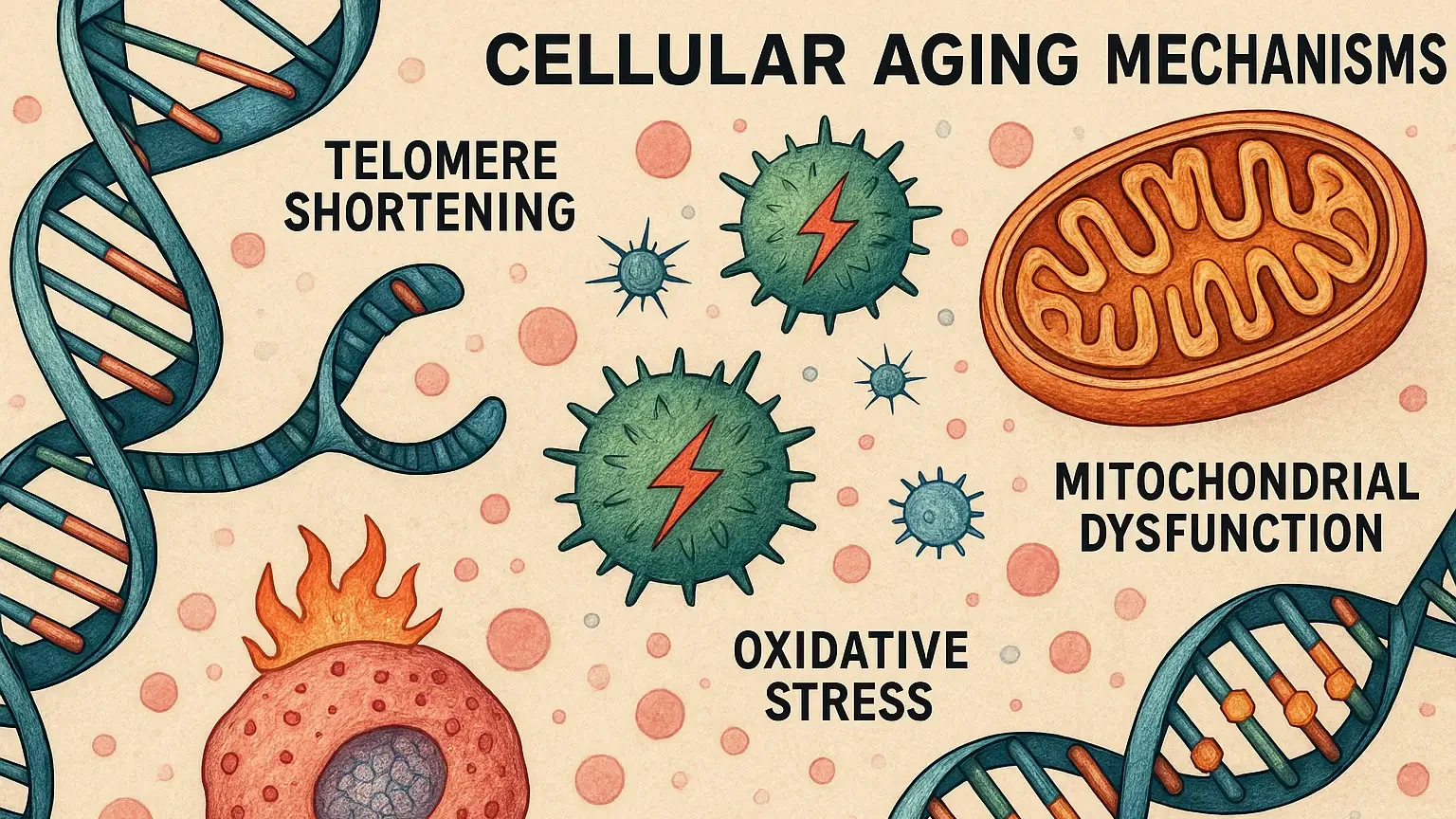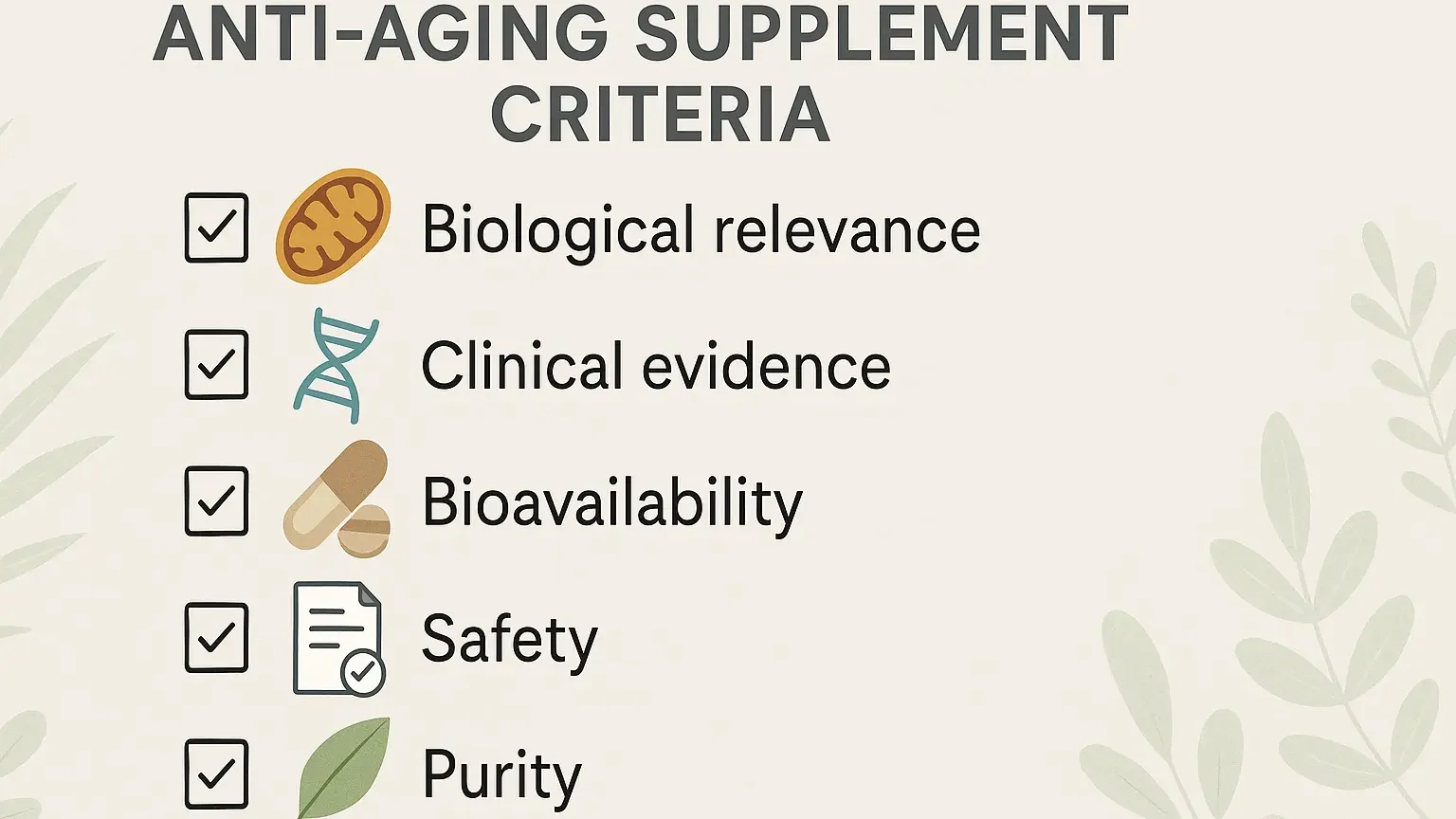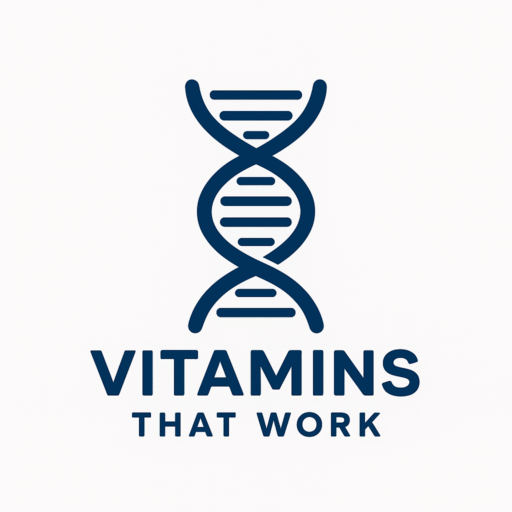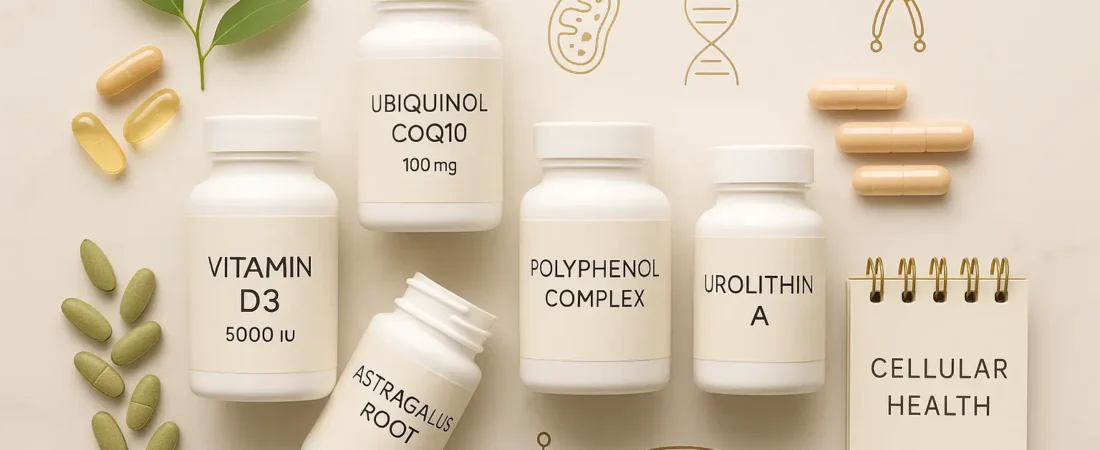Explore the most researched anti aging supplements shown to support telomere health, mitochondrial energy, and cellular longevity naturally.
Introduction: Why Aging Is More Than Just a Number
Many people turn to anti aging supplements to support energy, cognition, and longevity. But not all are backed by science. Aging is not just about how many years you have lived. It is about how well your cells function over time. Scientists now recognize a difference between chronological age and biological age. Your chronological age is your actual age in years, while biological age reflects the condition of your cells, tissues, and organs.
This difference is crucial because two people who are the same age on paper can look, feel, and perform very differently based on how their bodies have aged on a cellular level. That is where the concept of healthy aging comes into play. It is about maintaining energy, mobility, cognitive clarity, and immune strength. The goal is not just to add years to life, but life to years.
Emerging research shows that certain nutrients can support the body’s internal systems that decline with age. These include DNA repair, mitochondrial function, and inflammation regulation. This article explores the science behind the most promising anti aging supplements, focusing on clinically researched ingredients that support cellular longevity.
The Science of Cellular Aging: What Really Happens Over Time

At the core of aging is cellular wear and tear. Over time, our cells accumulate damage from both internal and external sources. Think of your body as a high performance machine. Without regular maintenance, its parts slowly degrade.
Biologists have identified several key mechanisms that explain how and why this happens. These are widely known as the hallmarks of aging. Understanding them provides a foundation for evaluating how supplements may help.
- Telomere Shortening: Telomeres are protective caps at the end of chromosomes. Every time a cell divides, these caps get shorter. When they become too short, the cell stops functioning properly or dies.
- Mitochondrial Dysfunction: Mitochondria are the energy producers of the cell. With age, they become less efficient and generate more harmful byproducts like reactive oxygen species.
- Oxidative Stress: An imbalance between free radicals and antioxidants leads to damage in DNA, proteins, and fats. This accelerates the aging process.
- Chronic Inflammation: Known as inflammaging, low level inflammation increases with age and is linked to nearly every major chronic disease.
- Epigenetic Changes: Chemical tags on your DNA can turn genes on or off. With age, these epigenetic patterns drift, causing cellular confusion and inefficiency.
These biological changes do not happen overnight. They accumulate silently for decades before symptoms of aging such as fatigue, poor memory, or joint stiffness start to appear. The good news is that emerging evidence suggests some nutrients can help counteract these processes by improving cellular resilience and repair.
How Anti Aging Supplements Fit into Modern Nutraceutical Science
As the scientific understanding of aging has evolved, so too has the exploration of targeted nutrition as a way to support long term health. Nutraceuticals, a term combining “nutrition” and “pharmaceutical,” refers to bioactive compounds found in food or dietary supplements that provide medical or health benefits. In the context of aging, nutraceuticals are being studied for their potential to slow or modify the biological processes that lead to cellular deterioration.
Researchers now recognize that aging is not simply the result of time passing but is driven by damage to DNA, proteins, and cellular structures. This insight has shifted the focus toward interventions that can modulate aging pathways. Certain nutrients, especially those with antioxidant, anti inflammatory, or mitochondrial support functions, are gaining attention for their ability to influence these mechanisms.
Nutraceuticals like vitamin D3, coenzyme Q10, polyphenols, and urolithin A are being evaluated in peer reviewed trials for their effects on energy metabolism, inflammation control, gene expression, and cellular repair. Although the supplement industry is vast and varied, a growing number of products are now being held to scientific scrutiny through randomized controlled trials and biomarker analyses. This provides a clearer view of which compounds genuinely support healthy aging and which lack sufficient evidence.
How to Evaluate Anti Aging Supplements: Science Based Criteria

Not all supplements are created equal, and not every popular health product qualifies as an anti aging agent. For a supplement to be considered credible in the space of longevity science, it must meet specific criteria rooted in biology and clinical validation.
- Biological Relevance: The supplement must act on one or more mechanisms of aging, such as oxidative stress, mitochondrial dysfunction, or telomere maintenance.
- Clinical Evidence: Peer reviewed studies, ideally randomized controlled trials, must show statistically significant benefits in aging biomarkers or age related functional outcomes.
- Bioavailability: The active compound must be absorbable in a form that the body can use. Some nutrients are effective only when delivered through liposomal or fat soluble carriers.
- Safety Profile: The supplement must be proven safe for long term use, with low risk of toxicity, contamination, or negative interactions with medications.
- Purity and Sourcing: High quality supplements disclose their ingredients, avoid synthetic fillers, and source their compounds from reputable suppliers.
These criteria help distinguish evidence based anti aging supplements from marketing driven fads. In the following sections, we will apply these benchmarks to specific ingredients that have been rigorously studied for their effects on cellular longevity.
Vitamin D3 in Anti Aging Supplements: Telomere and Immune Support
Vitamin D3 is well known for supporting bone health, but recent research has revealed its critical role in regulating immune function and cellular aging. One of its most compelling benefits is its potential to maintain telomere length. Telomeres are the protective caps on the ends of chromosomes, and their shortening is a recognized marker of biological aging. Short telomeres are associated with an increased risk of chronic disease, immune dysfunction, and early mortality.
In a study published in the journal Nutrients, higher blood levels of vitamin D were correlated with longer telomeres in a large adult population. This suggests that sufficient vitamin D status may slow cellular aging. Researchers believe that the vitamin’s ability to reduce systemic inflammation and oxidative stress plays a key role in this effect. These protective mechanisms help preserve the structural integrity of DNA during cell replication.
In addition to its telomere benefits, vitamin D3 supports both the innate and adaptive immune systems. It helps modulate the activity of white blood cells and enhances the body’s defense against pathogens. This function becomes increasingly important with age, as immune performance declines and inflammation rises.
Vitamin D3 is the preferred form for supplementation because it is more effective at raising blood levels than vitamin D2. It should be taken with dietary fat to improve absorption. A high quality option uses organic oils and avoids synthetic additives.
Recommended product: NatureWise Vitamin D3 5000 IU offers a full year supply in small, easy to swallow softgels. It uses organic extra virgin olive oil for better bioavailability and is both non GMO and gluten free.
Sources:
NIH: Vitamin D and Telomere Length
Harvard Gazette: Vitamin D and Aging
Astragalus Root: Telomerase Activation and Cellular Defense
Astragalus root has been used for centuries in traditional Chinese medicine, but modern science is now uncovering its potential to support healthy aging. The root contains unique bioactive compounds like cycloastragenol, which may activate telomerase—the enzyme responsible for extending telomeres. Unlike most supplements that aim to protect existing telomeres, astragalus may actually promote their repair and lengthening.
A study published in the journal Molecular Cell Biology found that compounds in astragalus stimulated telomerase activity in human cells, offering a unique method of DNA protection. While more large scale human trials are needed, this early evidence supports the potential of astragalus to influence longevity at the genomic level.
In addition to its effect on telomeres, astragalus has antioxidant and anti inflammatory properties that help defend cells from age related damage. It also supports adrenal health and may improve the body’s stress resilience, which is important for maintaining immune balance over time.
For best results, look for dual extracted or standardized root extracts that ensure consistent potency. Capsule forms are preferred for purity and ease of dosing.
Recommended product: Nature’s Way Astragalus Root provides 180 vegan capsules that are gluten free and non GMO. It is a well regarded option for those seeking immune and cellular support.
Source:
PubMed: Telomerase Activation by Astragalus
How Ubiquinol CoQ10 Boosts Energy in Anti Aging Supplements
Coenzyme Q10, or CoQ10, is a fat soluble compound that plays a central role in mitochondrial energy production. It is essential for the synthesis of adenosine triphosphate, the molecule that powers nearly every cellular function. As we age, our natural levels of CoQ10 decline, which can impair cellular energy output and contribute to fatigue, muscle weakness, and organ dysfunction.
Ubiquinol is the reduced, active form of CoQ10 and is more bioavailable than its oxidized counterpart, ubiquinone. In clinical studies, supplementation with ubiquinol has been shown to improve markers of cardiovascular health, increase cellular energy in older adults, and reduce oxidative stress. One study published in the Journal of the American College of Cardiology found that CoQ10 improved outcomes in patients with heart failure, a condition strongly linked to mitochondrial decline.
Beyond heart health, CoQ10 is being explored for its neuroprotective properties. Mitochondrial dysfunction is implicated in age related cognitive decline and neurodegenerative diseases. By supporting mitochondrial integrity, ubiquinol may offer protective benefits for brain aging as well.
For best results, look for ubiquinol in softgel form with added fats like olive oil or MCT oil to enhance absorption. The optimal dose for older adults typically ranges from 100 to 200 milligrams daily, depending on individual needs.
Recommended product: Qunol Ubiquinol CoQ10 200 milligrams provides a highly absorbable softgel formulation. It is designed to support energy production, heart function, and antioxidant defense in aging populations.
Sources:
NIH: CoQ10 and Mitochondrial Function
PubMed: Ubiquinol and Oxidative Stress in Aging
Polyphenol Complexes: Antioxidant Armor Against Oxidative Stress
Polyphenols are naturally occurring plant compounds known for their antioxidant and anti inflammatory properties. They help neutralize free radicals and reduce oxidative stress, a key driver of aging and age related diseases. Common polyphenols include resveratrol, grape seed extract, quercetin, and pomegranate ellagitannins.
Oxidative damage affects DNA, proteins, and cell membranes, ultimately leading to loss of cellular function. By buffering this damage, polyphenols help preserve tissue health and improve biological resilience. Studies have linked polyphenol intake to better cardiovascular health, cognitive performance, and metabolic regulation—all crucial aspects of healthy aging.
Resveratrol, one of the most studied polyphenols, activates cellular stress response pathways and may mimic some effects of caloric restriction, a known longevity intervention. Other compounds like quercetin and berberine support mitochondrial biogenesis and improve cellular detoxification.
A comprehensive polyphenol supplement should combine multiple ingredients to leverage their synergistic effects. Liposomal delivery or co formulation with healthy fats can improve absorption and bioavailability.
Recommended product: Resveratrol Supplement – 19 in 1 Organic Polyphenol Complex includes a wide range of polyphenols such as resveratrol, noni, quercetin, berberine, and acai. It is designed to support antioxidant defense and overall vitality.
Sources:
NIH: Polyphenols and Healthy Aging
MDPI: Antioxidants in Cellular Longevity
Urolithin A: The Mitophagy Enhancer for Muscle and Metabolic Health
Urolithin A is a metabolite produced in the gut when ellagitannins—found in pomegranate and other fruits—are broken down by gut bacteria. However, not everyone produces Urolithin A efficiently, which has led to interest in direct supplementation. This compound is gaining attention for its role in enhancing mitophagy, the cellular process that removes damaged mitochondria and recycles their components to maintain energy efficiency.
Mitochondrial dysfunction is a hallmark of aging and contributes to fatigue, loss of muscle strength, and metabolic decline. By promoting mitophagy, Urolithin A helps improve mitochondrial quality and function, leading to better energy production and muscle endurance. In a randomized controlled trial published in JAMA Network Open, older adults who received Urolithin A supplementation demonstrated improved leg muscle strength and mitochondrial biomarkers after several weeks of use.
Unlike other compounds that support mitochondrial health indirectly, Urolithin A appears to activate specific gene pathways related to mitochondrial turnover and cell repair. This makes it one of the most promising new molecules in the longevity field.
Look for supplements that contain pure Urolithin A in a clinically tested dosage. Capsules with minimal additives and third party testing are preferred to ensure potency and purity.
Recommended product: ProMito Urolithin A 500 milligrams provides a high potency dose in a clean capsule format. It is a targeted option for those interested in mitochondrial renewal and age related muscle support.
Sources:
JAMA: Urolithin A and Muscle Strength
PubMed: Urolithin A and Mitophagy
The Synergistic Effect of Lifestyle and Supplementation
Supplements can support cellular aging, but their effectiveness is greatly enhanced by a foundation of healthy lifestyle habits. Nutrition, sleep, physical activity, and stress management all influence the same biological systems that supplements target, such as inflammation, hormone balance, and DNA repair.
Adequate sleep, for example, supports immune regulation and circadian gene expression. A nutrient rich diet provides raw materials for repair and reduces oxidative stress. Exercise has been shown to increase mitochondrial biogenesis and improve insulin sensitivity. Meanwhile, chronic stress can accelerate telomere shortening and raise cortisol levels, undermining even the best supplement plan.
Combining high quality supplements with consistent lifestyle habits creates a synergistic effect that maximizes the benefits of both. This integrative approach is supported by longevity researchers who emphasize the importance of addressing multiple biological pathways at once.
Source:
NIH: Lifestyle Interventions for Healthy Aging
Supplement Comparison Table
| Supplement | Main Function | Best Form | Affiliate Link |
|---|---|---|---|
| Vitamin D3 | Supports telomere maintenance and immune function | D3 (cholecalciferol) in oil based softgel | Buy Now |
| Astragalus Root | Activates telomerase and reduces oxidative stress | Standardized root extract capsules | Buy Now |
| Ubiquinol CoQ10 | Improves mitochondrial function and energy | Ubiquinol in softgel with oil | Buy Now |
| Polyphenol Complex | Provides antioxidant support and inflammation control | Liposomal multi polyphenol blend | Buy Now |
| Urolithin A | Enhances mitophagy and muscle endurance | Pure Urolithin A capsule | Buy Now |
Conclusion: A Holistic, Evidence Based Path to Longevity
While aging is inevitable, how we age is increasingly recognized as a process we can influence. Cellular health plays a central role in how we feel, think, and function as we get older. The supplements discussed in this article are backed by emerging scientific evidence and are designed to support key biological systems such as DNA integrity, mitochondrial energy, and inflammation control.
These nutrients are not quick fixes or miracle cures. Instead, they are tools that, when paired with a healthy lifestyle, may slow the pace of biological aging and enhance your health span. Choosing high quality, clinically studied ingredients ensures you are investing in your health with clarity and purpose.
As always, speak with a healthcare professional before starting any new supplement regimen, especially if you have underlying conditions or take medications.
Frequently Asked Questions
1. Can supplements really slow aging?
Supplements cannot stop aging, but research suggests they may help reduce the rate of cellular decline. Certain nutrients can support DNA repair, reduce inflammation, and improve mitochondrial function, all of which play roles in biological aging.
2. Are these supplements safe for long term use?
Most of the supplements mentioned are considered safe when used as directed. However, individual responses may vary, and long term use should be discussed with a healthcare provider.
3. How long does it take to see results?
Benefits such as improved energy or mental clarity may be noticed in four to twelve weeks. However, cellular level changes like mitochondrial support and telomere maintenance take longer and require consistent use.
4. Can I combine all these supplements?
Yes, but it is best to introduce them gradually and monitor your body’s response. A personalized approach is always recommended.
5. Do I still need a healthy lifestyle if I take supplements?
Absolutely. Supplements enhance cellular function, but they work best alongside sleep, exercise, good nutrition, and stress management. A comprehensive lifestyle approach delivers the greatest benefits.
For a deeper understanding of how genetics can influence supplement needs and aging, check out our related article on genetic testing and MTHFR-related supplements. It explains how genetic variations like MTHFR can affect methylation, detoxification, and how the body uses nutrients factors closely linked to aging, inflammation, and overall cellular health.


